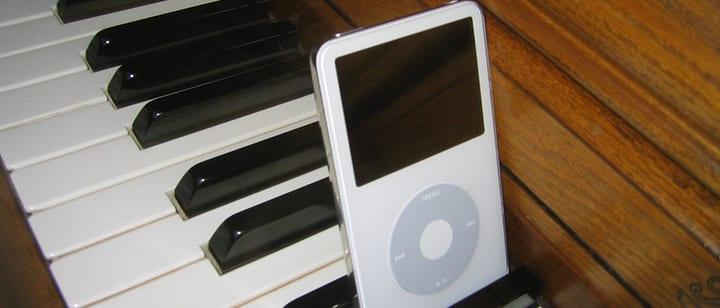What’s the easiest way to get better at piano? Break out your iPod and find out in this guest post by Brooklyn, NY teacher Julie P...
One of the best ways to get better at piano is to listen to other pianists. This is true no matter what genre of music you play and it means that you can use your iPod to improve your piano skills. Do want to be able to play pieces by Chopin or Brahms? Listen to concert pianists play pieces by those composers. Do you want to play in a pit orchestra on Broadway someday? Listen to the soundtracks of your favorite musicals. Do want to play keyboard in an alternative rock band? Listen to the keyboard players of your favorite groups. Here are a few ways that listening to music on your iPod can improve your piano playing.
Incorporate Style
There are so many different genres of music, and one of the most important things you can do is make sure you play each piece of music in the appropriate style. There are lots of tiny factors that contribute to a song’s style, including tempo, note lengths (legato vs. staccato, or anything in between), note attacks (accented or not), pedal use, rhythmic feel (straight, swing, disco, rock, etc.), and use of rubato. If you don’t play with the correct style, your favorite song from “Phantom of the Opera” could end up sounding more like a Ben Folds Five anthem.
As you listen to music on your iPod, pay attention to the elements listed above and see if you can replicate them. Are you holding notes for the right amount of time? A classical Nocturne by Chopin will likely need to be played more legato than a disco tune by Abba. If you play the Nocturne too detached, the melody won’t sound very beautiful, and if you play the Abba tune too legato it will lack the energy of disco music.
Are you playing in the correct rhythmic feel? Music by Count Basie doesn’t sound right without some swing, while classical music would sound incorrect if you added in that same swing. What kind of attacks are you using on your notes? An upbeat Broadway number will likely need a punchier sound than a quiet ballad by your favorite singer-songwriter.
For all of these elements, try playing along with the recording to see if your playing matches what you’re hearing. Or, take turns with the recording, first listening and then playing it yourself. It’s likely that you’ve already incorporated some of these elements in your playing, but the more things you pay attention to, the more authentic your playing will sound.
Diversify Your Playing
As you learn to play with stylistic accuracy, you’ll be able to branch out into new styles. If you can replicate what you hear, there’s no limit to the number of styles you can play. If you’ve always wanted to be able to play in a jazz band but have only ever played classical music, check out players like Count Basie and Ahmad Jamal to get a sense for how the piano functions in the jazz idiom. If you’re unfamiliar with how to play piano in a rock setting, check out Billy Joel or Ray Charles.
For learning new styles of music, start by listening to music on your iPod, away from the piano. Get a sense for the elements discussed above and think about how they’re different from styles with which you are already familiar. Once you have a handle on the new style, gradually start trying things out at the piano. Try to figure out the introduction to a song, or how to play part of a solo. Play along with recordings or transcribe new music using your iPod.
Quickly Learn New Songs
If you have new sheet music you’d like to learn, grab your iPod and listen to the piece a few times before attempting to play it. Even better, follow along on the sheet music while you listen. Rhythms that might have tripped you up are a lot simpler once you have the tune in your ear. Listening to music is the best way to get a sense of new songs in terms of style, rhythms, tempo, melody, and rhythmic feel.
Listening to music on your iPod is a great way to get better at piano. In addition to learning about musical styles from great piano players, you’ll also learn more about how other instruments approach various genres of music. This will make you a more well-rounded player with a greater depth of musical understanding. If you’d like to further learn how to use your iPod to improve your piano playing, find a teacher in your city through TakeLessons.com.
 Julie P. teaches flute, clarinet, music theory, and saxophone lessons in Brooklyn, NY. She received her Bachelor’s degree in Music Education from Ithaca College and her Masters in Music Performance from New Jersey City University. Learn more about Julie here!
Julie P. teaches flute, clarinet, music theory, and saxophone lessons in Brooklyn, NY. She received her Bachelor’s degree in Music Education from Ithaca College and her Masters in Music Performance from New Jersey City University. Learn more about Julie here!
 Photo by DoctorButtsMD
Photo by DoctorButtsMD
Suzy S.
